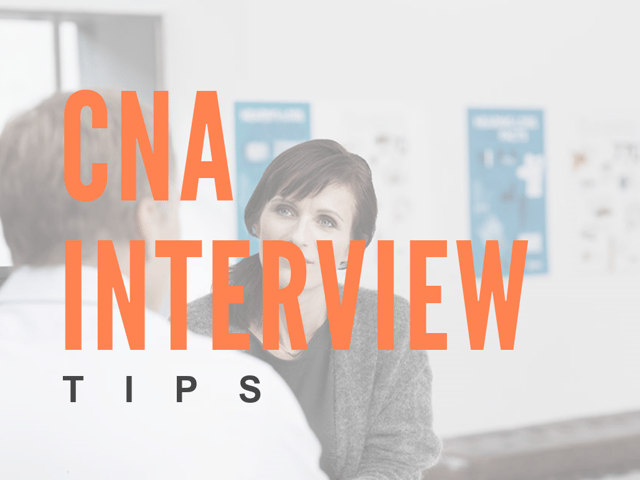
CNA Interview Tips
Starting your journey as a Certified Nursing Assistant (CNA) is indeed a fulfilling path. Having accomplished the significant step of passing your CNA exam, you’re now gearing up for the important next phase: the job interview. The insights we provide here are intended to comprehensively equip you for this crucial juncture. We’ve laid out everything you need to know, from the types of questions you’re likely to encounter, to strategies for effectively demonstrating your knowledge, skills, emotional resilience, and unwavering dedication to patient care.
Moreover, we underscore the significance of maintaining professional etiquette and the impactful gesture of post-interview follow-ups, aiding you to leave an indelible, positive impression. As you approach this landmark moment in your healthcare career, let these resources help steer your interview preparation with confidence and success.
Prepare for Common Interview Questions
Role-Specific Questions
During a CNA job interview, you’ll likely face several questions that are specific to the role of a CNA. These questions are designed to gauge your understanding of the job, your experience, and your ability to handle the unique challenges that come with it.
You might be asked, “What drew you to a career as a CNA?” This is a chance for you to express your passion for caregiving, your interest in healthcare, or a personal experience that inspired you to choose this path.
Another question could be, “How do you handle stressful situations?” The interviewer wants to see your problem-solving skills and coping mechanisms for stress, as CNAs often work in high-stress environments. Be sure to give specific examples to showcase your resilience and adaptability.
You might also face a question like, “Describe a time you had to handle a difficult patient.” This question aims to evaluate your patience, understanding, and problem-solving skills. Use an example from your past experiences to illustrate how you managed the situation while ensuring the patient’s comfort and dignity.
Remember, role-specific questions aim to gauge your practical and technical knowledge of the role, so provide examples from your experience that demonstrate your abilities.
Behavioral Questions
Behavioral questions are another common component of job interviews, including CNA interviews. These questions are based on the idea that past behavior is the best predictor of future behavior.
One common behavioral question is, “Describe a time when you demonstrated compassion at work.” This question seeks to understand your level of empathy and compassion—two critical qualities for a CNA. Be sure to describe a specific instance where you went above and beyond to provide compassionate care to a patient.
Another potential question is, “Tell me about a situation when you had to collaborate with a difficult colleague.” This question aims to assess your interpersonal skills and your ability to work effectively as part of a team, even under challenging circumstances. Again, use a real-life example to illustrate how you navigated the situation while maintaining professionalism and ensuring patient care.
When answering behavioral questions, use the STAR method (Situation, Task, Action, Result) to structure your responses clearly and concisely. This will help you provide thorough answers that effectively demonstrate your skills and suitability for the role.
Demonstrate your Knowledge and Skills
The role of a Certified Nursing Assistant (CNA) is both technical and personal. During an interview, it’s essential to illustrate your technical competency in nursing care, as well as your emotional resilience and your ability to handle the demanding aspects of the job.
Highlight Technical Skills
The daily tasks of a CNA are diverse and require a broad range of technical skills. Therefore, it’s crucial to highlight the unique competencies you bring to the table.
You should discuss any training programs you’ve completed or certifications you’ve achieved that align with the responsibilities of a CNA. This could be basic training, such as taking vital signs or patient hygiene, but also specialized certifications. For instance, you may have a certification in CPR, first aid, or the administration of specific medication.
Another key area you may want to discuss is your experience or training in specialized care. This could involve working with dementia patients, providing end-of-life care, or offering support for patients with specific health conditions like diabetes or heart disease. Emphasizing these special skills can set you apart from other candidates by demonstrating your commitment to ongoing learning and your ability to adapt to the specific needs of diverse patient populations.
Remember, when discussing your technical skills, it’s not just about listing what you’ve done or achieved. You should aim to convey your understanding of why these skills are important and how they impact patient care.
Showcase Emotional Resilience
Working as a CNA can be emotionally challenging. You’re interacting with patients and their families during some of their most vulnerable moments. Therefore, having emotional resilience — the ability to adapt to stressful situations or crises without lasting difficulties — is an invaluable trait.
During your interview, you’ll want to showcase your emotional resilience. Provide examples of times when you’ve worked in high-stress or emotionally charged situations. This could be a time when you cared for a particularly difficult patient, dealt with an emergency, or supported a patient and their family through a challenging diagnosis.
Explain how you navigated these situations and the strategies you employed to manage your emotions while providing the best care possible. This might include methods of self-care you use to keep yourself grounded, how you stay focused on the needs of the patient even when under significant stress, or how you seek support from your colleagues when needed.
Showcasing your emotional resilience isn’t just about proving you can handle the tough parts of the job. It’s about showing that you can maintain your empathy and compassion, even in the most trying situations. Demonstrating this resilience lets interviewers know that you’re not only capable of the job, but you’re also prepared to handle its emotional demands with grace and professionalism.
Show your Commitment to Patient Care
As a Certified Nursing Assistant (CNA), your primary responsibility is to provide high-quality care to patients. While technical skills are crucial, your dedication to patient care is just as, if not more, important. When you go for your CNA interview, make sure that your commitment to patient care shines through.
Emphasize Compassion
Compassion is a vital attribute for any healthcare professional. It involves demonstrating empathy towards patients and understanding their needs and feelings. It’s about more than just administering necessary care; it’s about doing so in a way that makes patients feel cared for and understood.
When answering interview questions, continually bring the focus back to your compassion. Discuss experiences that highlight your empathetic nature. For instance, perhaps there was a time when you went above and beyond to comfort a distressed patient, or maybe you implemented strategies to better communicate with patients who have difficulty expressing themselves.
It’s not just about explaining what you did, but also why you did it. Talk about how you recognize that every patient is an individual with their own needs and emotions, and how this understanding drives you to provide the most compassionate care possible.
Display Dedication
Showing your dedication to the role goes a long way in setting you apart as a candidate. This dedication can take on many forms, such as pursuing additional training, staying updated with the latest best practices, or continuously looking for ways to enhance patient care.
Discuss any additional courses you’ve taken or certifications you’ve achieved that go beyond the basic requirements of a CNA. This could be anything from advanced medical training to courses on patient communication or dementia care. Not only does this show your commitment to learning, but it also demonstrates a desire to offer the best care to your patients.
If you’re planning to pursue further education or have goals for your career development, share them. This could involve plans to specialize in a certain area of care, becoming a Registered Nurse, or even training in administrative tasks to take on more responsibility in a healthcare setting.
Highlighting your dedication shows that you’re not only committed to your personal growth but also deeply invested in improving the quality of care that you provide to your patients. This will convey to the interviewer that you’re a reliable professional who will bring value to their healthcare team.
Mastering Professional Etiquette
Beyond preparing for the interview questions and showcasing your skills and experience, there are other essential elements to consider when going for a CNA interview. Professional etiquette, which includes dressing appropriately and punctuality, leaves a lasting impression on your potential employer. These aspects speak volumes about your seriousness towards the job and respect for the interviewer.
Dressing Professionally
The way you dress for your interview is crucial. It’s your first chance to make a visual impression on your potential employer, and it sets the tone for the interview.
As a healthcare professional, the key is to look neat, clean, and professional. While you may wear scrubs in your role as a CNA, it’s usually better to opt for business or business-casual attire for the interview. This could be a suit, or for a more casual setting, neatly pressed pants and a collared shirt or blouse could work. Make sure your clothes are clean and ironed, your shoes are polished, and you maintain an overall tidy appearance.
Avoid flashy jewelry, loud prints, or overly casual clothes like jeans or t-shirts. It’s always better to be overdressed than underdressed for an interview. Also, personal hygiene is of the utmost importance in healthcare, so ensure you have fresh breath, clean nails, and a well-groomed appearance.
Arriving on Time
Punctuality is a highly valued quality in any profession, and healthcare is no exception. In a role where every minute counts, arriving late can give the impression that you’re unreliable.
Plan to arrive at least 15 minutes early for your interview. This allows time for any unexpected delays, and also gives you a few minutes to gather your thoughts and prepare mentally for the interview.
Research the interview location ahead of time and check the route and traffic conditions on the day. If you’re taking public transportation, know the timetable and plan for alternatives in case of cancellations or delays.
Arriving on time shows respect for the interviewer’s time and signals that you’re a professional who can be relied on to be punctual in your duties.
Practicing Good Manners
From the moment you step into the building until you leave, remember to be polite and respectful to everyone you meet. This includes reception staff, other CNAs, nurses, and of course, your interviewers.
Remember to turn off your phone before the interview to avoid any interruptions. During the interview, listen attentively, make eye contact, and refrain from interrupting the interviewer.
Follow up After the Interview
Following up after an interview is an often overlooked, yet crucial, part of the job application process. A well-crafted follow-up message serves several purposes. It reaffirms your interest in the position, helps you stand out from other candidates, and shows your professionalism and good manners.
Reiterate Your Interest
Your follow-up message is an opportunity to remind the interviewer of your interest in the role and enthusiasm for the organization. You should also take this chance to reinforce why you believe you’re a good fit for the position.
For example, you might mention a specific part of the conversation that resonated with you or elaborate on a point you felt you didn’t fully express during the interview. You could say something like, “Our discussion about your facility’s focus on patient-centered care reaffirmed my desire to be part of your team. I believe my experience with individualized care plans would be a strong addition.”
Ensure that your message is personalized and not a generic follow-up. This means addressing the interviewer by name and referencing specific details from your conversation. This shows that you were engaged during the interview and that you’re genuinely interested in the position.
Show Appreciation
Always express gratitude in your follow-up message. Thank the interviewer for taking the time to meet with you and for considering your application. You might say, “I appreciate the time you took to discuss the CNA position with me. I enjoyed learning more about your facility and the team.”
Being gracious leaves a positive impression, regardless of the outcome of the interview. Even if you don’t get this job, the interviewer might consider you for future positions or recommend you to others in their network.
Finally, remember that timing is key when sending a follow-up message. You’ll want to send your email or note within 24 hours of the interview while the conversation is still fresh in both your minds. This not only demonstrates eagerness and professionalism but also keeps you at the forefront of the interviewer’s mind as they make their decision.
Get Ready to Ace your CNA Interview!
Mastering a Certified Nursing Assistant (CNA) interview requires thorough preparation, a detailed understanding of the role, and a passionate commitment to patient care. As you ready yourself for the interview, remember to prepare for both role-specific and behavioral questions, emphasizing your technical skills, emotional resilience, and dedication to your patients.
Your professional etiquette, including dressing appropriately, arriving on time, and practicing good manners, is just as important in leaving a positive impression. After the interview, be sure to follow up with a personalized and appreciative message, reaffirming your interest in the role.
The job of a CNA is demanding yet rewarding. By effectively showcasing your skills, experience, and commitment to patient care, you position yourself as a strong candidate ready to make a meaningful contribution to any healthcare team. Good luck with your interview, and here’s to your future in providing compassionate, high-quality patient care!
Keep Reading

Certified Nursing Assistant Exam Blog
How Long Does it Take to Become a CNA?
As a profession on the frontline of healthcare, Certified Nursing Assis…

Certified Nursing Assistant Exam Blog
How to Do Well on the CNA Skills Test
Over 1.3 million nursing assistants work in our healthcare system today…

Certified Nursing Assistant Exam Blog
What Does a Nursing Assistant (CNA) Do?
Are you interested in exploring medical careers? The healthcare industr…